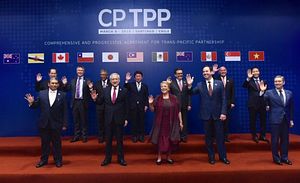Japan has become the second country to formally lodge a notification that it has completed the domestic procedures for the Trans-Pacific Partnership-11 agreement (officially known as the Comprehensive and Progressive Agreement for Trans-Pacific Partnership). Tokyo signaled it would press other countries to follow suit, in a bid to bring the agreement into force quickly.
“Moreover, it is hoped that it will be a powerful message from Japan, as the standard-bearer for free trade, to the world amidst the current global trend towards protectionism, and a significant step to create free and fair 21st-century rules in the Asia-Pacific region,” the Ministry of Foreign Affairs said in a statement issued on July 6.
The move comes amid significant global headwinds over trade. Tokyo recently stepped up its efforts to prevent the United States from moving ahead with tariffs on automotive imports. It has previously made unsuccessful representations to get exceptions from the Trump administration’s tariffs on steel and aluminum. At the same time, the trade dispute between the United States and China has intensified, causing market jitters about the prospect of a damaging trade war.
Prime Minister Shinzo Abe has so far resisted pressure from Trump to head in the direction of a bilateral trade agreement between Japan and the United States. Rather, Tokyo has made conspicuous efforts to back multilateral pacts, including the revamped TPP (which no longer includes the U.S.) and the ASEAN-centered Regional Comprehensive Economic Partnership (RCEP), which would cover a greater share of global GDP thanks to inclusion of China and India. The latter deal remains under negotiation, with Tokyo having hosted a ministerial-level meeting at the beginning of July. The 23rd round of RCEP negotiations – focusing on issues such as market access, rules of origin, intellectual property, and e-commerce – is to be held in Bangkok from July 17 to 27.
Japan announced that it had completed the domestic procedures for the TPP-11 on the day it formally notified New Zealand, which is designated as the depositary for such declarations. The agreement specifies that the TPP-11 will enter into force 60 days after at least six signatories have given written notice of the completion of any relevant domestic legal procedures.
Japan, the government’s statement said, was the second country to do so after Mexico, and it hoped this would help build momentum toward the entry into force. “Japan will continue to work with other signatories to achieve early entry into force of the TPP-11 agreement,” it added.
Meanwhile, Japan is trying to head off potential U.S. tariffs on automotive imports. As previously reported on these pages, Tokyo is seriously alarmed by the impact of measures that could flow from the U.S. Commerce Department’s national security-related investigation into the sector. Japan’s economy would take a hit equivalent to 0.1 percent of GDP (or about $5 billion) if Washington slapped tariffs of 25 percent on imports of cars and car parts, according to modeling released by Germany’s ifo Institute in May.
Since then, Japan has published a strongly worded submission to the Commerce Department. Japanese auto-related companies, the submission argued, had played a vital role in supporting the growth of the U.S. manufacturing base since starting business in the United States in the 1980s.
“Any trade restriction measures based on Section 232 of the Trade Expansion Act of 1962, if imposed, could seriously affect more than 1.5 million jobs created by Japanese auto-related companies in the U.S., and by inflicting costs on the consumers, lead to devastating effects on the U.S. and global economy,” said the submission, released on June 29.
Japan also warned against “putting the global free trade system at great risk” – indicating the seriousness with which Tokyo views recent developments in U.S. trade policy. On the TPP, at least, Japan sees an opportunity to secure a win.

































